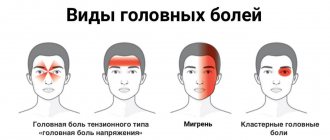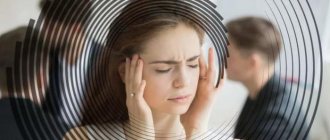Dizziness occurs unexpectedly and abruptly, causing inconvenience to the patient and others. Most often, the head becomes dizzy in transport during sharp turns, changes in height on swings, carousels, or when getting out of bed. Why you get dizzy if you stand up suddenly, and what to do about this unpleasant phenomenon, we’ll figure it out in the article.
The most common is positional vertigo. The attack lasts literally a minute. It happens when you wake up, jump out of bed, or throw your head back. The patient feels sick, his vision suddenly becomes dark, and he feels dizzy. Fainting is less common. In order to stop unpleasant symptoms, it is enough to take the starting position. New seizures during the day are caused by movement and active turning of the head. This pathology is more often diagnosed in women.
The main recommendation is to live in a gentle manner. Don't jump out of bed right away, but sit for a minute and start moving. If you are called, count to three and turn around smoothly.
Possible causes of dizziness
At an appointment with a neurologist, a problem is often encountered: “Why, when I suddenly stand up, do I get dizzy and my vision gets dark?” Typically, this problem is associated with impaired functioning of the blood vessels in the brain or heart. One way or another, the head is spinning and the vision suddenly becomes dark due to ischemic anoxia.
In turn, it appears due to:
- Lack of cardiac output;
- Arrhythmia, fibrillation, heart rhythm disturbance;
- Decreased blood pressure, resulting in impaired blood supply to the brain.
Often the problem “dizzy when I get out of bed” is observed in women during menstruation. After all, during this period their body weakens, and many lose their appetite. That’s why weakness appears, and if you suddenly get up from the sofa, your vision becomes dark.
True dizziness occurs due to damage to the vestibular apparatus of the inner ear. At the moment of an attack, it seems to the patient that the walls are starting to move closer together, the ceiling is moving up or falling on his head. Symptoms are complemented by nausea, increased sweating and breathing problems.
Such episodic dizziness is called verigo. They are provoked by various diseases, for example, Meniere's syndrome or complications after severe viral diseases, including labyrinthitis - the consequences of otitis media or viral herpes. In these cases, hearing problems are added to the unpleasant sensations.
People dependent on blood pressure surges suffer from these symptoms. The attack, caused by a sudden change in pressure, is fleeting and can have fatal consequences if the person falls.
Diagnostic features
In order to find out the reasons why you feel dizzy when getting out of bed, you need to consult a doctor.
He will prescribe a set of studies that will include the following procedures:
- Submission of laboratory blood and urine tests.
- Ultrasound of internal organs.
- Fluorography of the lungs and radiography of the cervical spine.
- MRI and CT scan of the head.
In addition, a person is able to independently conduct a test to identify orthostatic hypotension. For example, you need to measure your blood pressure and heart rate several times while standing. If a stable result is obtained, then you should go to bed and then carry out the same procedures.
After this, you need to get up and conduct a similar study in a few minutes. In this case, the procedure should be repeated after 3, 5 and 10 minutes. This will make it possible to determine how quickly the body restores normal pressure.
As for the results, they are as follows:
- The pulse increased to 11 beats - the state of health is normal;
- The number of beats has increased by 12-18 units – there are non-dangerous problems with blood pressure;
- The indicator increases to 19 beats or more - the patient has a rather dangerous condition that can provoke fainting when standing up suddenly.
During the examination, it is necessary to contact the following specialists: cardiologist, therapist, neurologist. It is especially important to consult with doctors in time if dizziness when getting up and when lying down bothers you very often.
If attacks are rare, and a person has genetically low blood pressure, then this poses no danger to the body. In this case, the head may quickly become dizzy, but the attack quickly passes. However, it is necessary to monitor your health even in this case.
What to do if you feel dizzy when you rise suddenly
Before prescribing therapy, the doctor conducts a diagnosis. You need to check your intracranial pressure with a neurologist, your heart rate with a cardiologist, and your blood pressure with your family doctor.
A general blood test is rarely prescribed. One way or another, treatment of the disease must be comprehensive, including a number of procedures.
Symptoms of “dizzy”, “when I get out of bed, my vision gets dark” can be overcome through the development of the vestibular apparatus. Do a special workout in the morning, and the negative feelings will gradually subside.
The complex consists of several exercises:
- Sit in the center of the bed with your legs dangling. Then lie on your side, raising your head 45° up. Stay in this position for half a minute or until the attack ends. Then stand up and repeat the exercise on the other side. The norm is 5 times.
- Perform sharp turns of the head 3-4 times alternately to the right and left. Take a break for an attack, if one occurs, before changing sides of the turn.
- Lower your head as low as possible, then raise it sharply. Perform 3-4 times. Then raise your head and lower it sharply down.
This course must be performed daily until the symptoms disappear completely, and then for three days to consolidate. All exercises must be performed carefully, without sudden movements, so as not to darken your vision.
Young people are dizzy
The most common cause of dizziness in this situation in young people is the so-called benign positional vertigo, when the problem occurs with sudden changes in head position. Here it is worth understanding that when many people are afraid of a stroke against the background of severe dizziness, it is precisely a rare cause of this symptom.
Question answer
Why do you often feel dizzy? Benign positional vertigo is a condition where the problem occurs in the peripheral part of the vestibular system. The latter is, in simple terms, a kind of sac and three semicircular tubules located in different planes. This sac contains small pieces of otolith - this is an accumulation of calcium like small pebbles. Sometimes such pebbles can come out of this sac and end up in some, most often posterior, tubule. And when a person turns his head in the plane where the pebble hit, severe dizziness appears. If a person feels dizzy only when turning in any direction and there is a position where she does not feel dizzy at all, then most likely this is benign positional vertigo, and not a stroke, as everyone often thinks.
Freedom for the neck muscles
The feeling “when I get out of bed, my vision gets dark” is associated with a decrease in blood supply to the occipital lobe of the brain. For most people, the junction of the neck and head is constantly tense. A spasm occurs in the muscles, which pinches the arteries passing through this area. It is necessary to relieve the tension in the suboccipital part a little and the condition will return to normal.
The following exercise effectively relieves spasms of the neck muscles, mainly the trapezius:
- push your chest forward (for those who slouch, a must!);
- smoothly move your shoulders up and down;
- relieve tension from your neck and shoulders. In the future, monitor their position. As soon as they begin to rise, take the correct position. Over time, this will become a habit.
Diagnostics
When turning to a therapist with complaints of headaches, the patient most often goes through several stages of examination. The first is to compile a complete symptomatology, so the doctor will know the duration and nature of the dizziness.
Why can our articles be trusted?
We make health information clear, accessible and relevant.
- All articles are checked by practicing doctors.
- We take scientific literature and the latest research as a basis.
- We publish detailed articles that answer all questions.
After which, based on the results of the initial examination, a referral to other specialists is issued: dentist, ophthalmologist, otolaryngologist or neurologist.
Dizziness when tilting your head
The head and neck perform functions such as supporting the functioning of the brain, sensory organs and blood vessels.
In some cases, in addition to this, additional tests and studies are prescribed. In modern medicine, to diagnose headache pain, they use:
- X-ray , which in most cases is prescribed for suspected head injuries, sinusitis or dropsy.
- Ultrasound or ultrasound diagnostics. This method helps to identify diseases associated with blood vessels, pathologies of the hematopoietic system, aneurysms and atherosclerosis.
- CT - computed tomography. Most often used to determine the presence of: changes in the structure of brain tissue, hemorrhages, tumors, thrombosis, aneurysms.
- EMG - electromyography. This type of diagnosis is used when there are suspected disorders in the neuromuscular system or nerve damage.
- Electroencephalography (EEG). It is used to determine the state of brain activity, its vascular lesions, some signs of a tumor, and hematomas.
- Laboratory research methods - for the diagnosis of infectious diseases, inflammation, disorders in cholesterol metabolism or to identify autoimmune processes.
- MRI – magnetic resonance imaging. Used to determine disorders in the blood circulation of the brain, the consequences of strokes, sinusitis and to diagnose tumors.
A variety of modern research helps to determine an accurate diagnosis with 99% accuracy and, according to the data obtained, to create a treatment that will not only help get rid of headaches, but also completely cure the disease.
How to saturate your brain with oxygen
Spasms of the neck muscles and compression of the cervical artery leads to a decrease in oxygen supply to the brain and problems with blood circulation. This is where the problem arises - “when I get out of bed, my vision gets dark.” Therefore, the basis of treatment for this disease is drugs that improve blood circulation. These include:
- Cavinton;
- Sermion;
- Mexiprim and others.
Because of their quick response, they were nicknamed the anti-vertigo special forces.
Betaserc stands out among long-term use drugs. This medicine improves balance, eliminates ringing in the ears, and no longer feels dizzy. Excellent portability makes it suitable for use at any age. It is not addictive, but the dosage must still be observed. It is included by the Ministry of Health in the list of drugs dispensed free of charge upon presentation of a preferential prescription written by a doctor.
What are you complaining about?
Finding the true cause of dizziness is not an easy task. After all, completely different conditions can be hidden behind the patient’s complaints, many of which are the result of stress and emotional disorders. As a rule, such dizziness, which experts call non-systemic, is accompanied by palpitations, chills, a feeling of intoxication, lightheadedness, lack of air, blurred vision, and occurs spontaneously in a stuffy room, in the subway, or in a crowd. There is nothing pleasant about this, of course. But such dizziness does not pose a particular risk to health and life.
The same cannot be said about true, systemic dizziness with a clearly defined illusion of movement (of the patient himself or surrounding objects), which manifests itself not only as constant, painful attacks. They are fraught with more serious problems. It is no secret that dizziness is a frequent companion to such serious diseases as Meniere's disease (a chronic non-inflammatory disease of the inner ear), neuroma (tumor of the auditory nerve), circulatory disorders in the auditory artery (in which not only vestibular function is affected, but also hearing), stroke. .
Folk remedies
The healers of the past left their descendants a treasure trove of herbal remedies that help eliminate the problem of frequent darkening of the eyes. If you experience regular dizziness on the eve of lunch, it is recommended to eat one teaspoon of dried seaweed, and take fern infusion (1/2 cup) before each meal.
Prepare the infusion as follows: 1 tbsp. pour a spoonful of raw materials (sold at the pharmacy) with a glass of boiling water. Let it brew for 1 hour. The medicine is prepared quickly while you are getting ready for work.
Alternatives:
- Pour 3 tablespoons of hawthorn fruit into 3 cups of boiling water. Leave for 1 hour. Take a glass before each meal.
- 1 teaspoon of meadow clover inflorescences is poured into a glass of boiling water and boiled for three minutes. Take 1 tablespoon 4 times a day.
- Pour 10 tablespoons of clover into 0.5 liters of vodka. Leave for 10 days. Take a teaspoon 3 times a day.
Treatment
Modern specialists use complex therapy to combat head pain. The main components of treatment include several types.
Self-medication is dangerous with complications!
Attention
Despite the fact that our articles are based on trusted sources and have been tested by practicing doctors, the same symptoms can be signs of different diseases, and the disease may not proceed according to the textbook.
Pros of seeing a doctor:
- Only a specialist will prescribe suitable medications.
- Recovery will be easier and faster.
- The doctor will monitor the course of the disease and help avoid complications.
find a doctor
Do not try to treat yourself - consult a specialist.
Use of medications
The patient takes medications either in tablets or by injection to relieve inflammation or spasms in the body. In addition to the main healing function, many such drugs have analgesic properties. Medicines may be prescribed as the only treatment option or as part of a complex of treatment procedures.
Massage
This method of treatment is prescribed in most cases after traumatic brain or neck injuries, for basilar migraines. Experts recommend undergoing this procedure only in hospitals or private clinics.
Physiotherapy
Also, as a rule, it is used as part of a complex treatment, and not as an independent method. Physiotherapy is a method of influencing the body using heat, ultrasound, direct or alternating current. Mainly used in the treatment of migraines.
Manual therapy
Currently gaining great popularity. Chiropractors will help identify the source of pain, eliminate it, and thereby relieve the patient of pain. But so far this method is used only as an addition to the main treatment.
Osteopathy
An osteopath treats pathologies in joints and muscles. Used as a component of therapy.
Physiotherapy
A similar procedure is carried out under the guidance of a sports doctor, who will help create a program of carefully selected exercises that will help with dizziness after injury, accumulated fatigue or stress.
Botox injections
A relatively new method of treating headaches. Botox is injected into the spasming muscle, where its effects almost instantly help relieve pain.
Extracorporeal hemocorrection
Indications for the use of this method of treatment are vascular atherosclerosis. This method is based on removing excess cholesterol and other elements from the bloodstream that contribute to the formation of plaques, which create obstacles to normal blood flow. Ridding the blood of autoantibodies in this way increases the effectiveness of treating diseases of the immune system and multiple sclerosis.
Acupuncture
It is not used as an independent method of treatment, but only in combination with other methods. Certain points responsible for a particular process in the body are affected by short-term acupuncture. This procedure allows you to activate metabolic processes and the work of individual organs.
It would seem that dizziness when standing up is an insignificant symptom that one may not notice, but this is not the case, since this particular symptom indicates the presence of many serious diseases.
Associated symptoms
Other symptoms that may occur during attacks of dizziness include:
- colored circles before the eyes, bright flashes;
- tachycardia;
- temporary visual impairment;
- bradycardia;
- weakness;
- trembling of limbs;
- sweating;
- deterioration of hearing, taste, smell;
- rapid breathing, shortness of breath.
You should definitely consult a doctor if you have:
- vertigo with ringing and noise in the ears;
- severe headache, pressure on the back of the head, partial or complete loss of hearing, the ears have started to become blocked;
- Sharp turns of the head cause a fainting state, blood may rush to the face;
- dizziness accompanied by nausea and vomiting;
- attacks of vertigo end in loss of consciousness;
- there is a severe cough, heartburn, toothache;
- double vision, lack of sensitivity, weakness in the limbs.
Why do men get dizzy?
Dizziness in men occurs as a result of dysfunction of the vestibular apparatus, damage to the inner ear due to injury, the presence of an infectious disease or virus. Causes of vertigo include:
- migraine;
- encephalitis;
- cerebrovascular accidents;
- traumatic brain injury;
- multiple sclerosis;
- inflammation of the inner ear;
- Meniere's syndrome;
- stroke;
- pinched nerve in the cervical vertebra;
- osteochondrosis;
- vegetative-vascular dystonia.
In addition, vertigo when changing body position can be caused by:
- intoxication of the body due to excessive consumption of alcoholic beverages, poisoning with medications or toxic substances;
- sudden jumps in blood pressure;
- psycho-emotional or physical fatigue, stress, lack of sleep. Doctors have proven that stress is more dangerous for men than for women, since they tend to keep emotions to themselves and cope with their problems on their own.
Possible diseases
What causes dizziness when lying down or standing up? The cause can be a number of diseases.
One of the reasons may be hypotension
Low blood pressure or hypotension leads to insufficient oxygen and nutrients to the brain. The fluid in the inner ear, which is responsible for the sense of balance and signals about body position, is normally under a certain pressure.
If this pressure is not enough, the fluid stops moving correctly, and the brain goes into a stupor, cannot correctly understand impulses and signals, which causes dizziness when there is a sudden change in body position. For hypotension, it is necessary to take general strengthening and vascular tonic drugs.
Vestibular neuritis
Vestibular neuritis (neuronitis) can occur at any age and is often a complication after acute respiratory viral infection or influenza.
The disease develops acutely, the person experiences severe rotational dizziness, nausea, painful and repeated vomiting, loss of coordination and balance, and twitching of the eyeballs. Vertigo worsens with the slightest movements of the head.
This condition lasts 3-4 days, then gradually passes. All this time the patient can only sit or lie down. But the consequences in the form of mild vertigo and unsteadiness of gait may persist for several months.
ENT diseases
Sometimes the cause of dizziness can be ear diseases:
- acute otitis media;
- chronic otitis media;
- inflammation of the inner ear.
The cause of otogenic vertigo may be an ordinary cerumen plug that disrupts the patency of the Eustachian tubes connecting the nasal cavity to the middle ear. Treatment consists of eliminating the underlying disease.
Osteochondrosis of the cervical spine
Cervical osteochondrosis leads to compression of the artery, affecting blood circulation and nutrition of the brain.
The pathology is characterized by almost constant dizziness, accompanied by darkening of the eyes, loss of orientation in space, and fainting. You can help the patient if you make him lie with his head down.
Inflammation and tumors of brain tissue
Brain tumors, if they are located where the brain stem enters the auditory nerve, can cause dizziness.
Formations of such localization are manifested by a gradual deterioration in hearing, noise, a feeling of instability, and rotational vertigo.
Vertebral hernia
Hernias of the spine can be completely asymptomatic and detected only during a random examination. But more often they are accompanied by pain in the head, shoulders and neck, dizziness, increased blood pressure, tinnitus, and numbness of the extremities.
Treatment, depending on the severity of the pathology, is conservative or surgical. It depends on the location, number of hernias, and severity of manifestations.
Vegetovascular dystonia
Vegetative-vascular dystonia manifests itself in an inadequate vascular response. They either expand or contract, resulting in loss of tone and increased blood pressure. Because of this, cerebral circulation suffers, and, therefore, vertigo is possible.
With this diagnosis, doctors recommend taking a course of medications that normalize vascular tone. You need to follow a daily routine, rest more, walk in the fresh air and do gymnastics.











